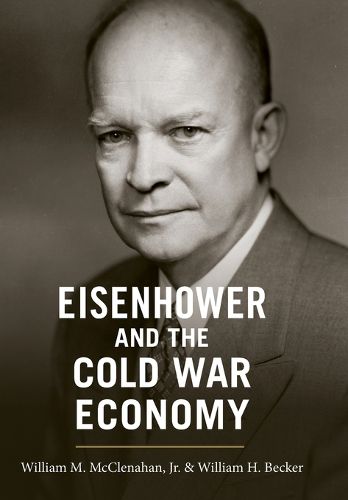Readings Newsletter
Become a Readings Member to make your shopping experience even easier.
Sign in or sign up for free!
You’re not far away from qualifying for FREE standard shipping within Australia
You’ve qualified for FREE standard shipping within Australia
The cart is loading…






Throughout his two-term presidency, Dwight D. Eisenhower faced the challenge of managing a period of peacetime prosperity after more than two decades of depression, war, and postwar inflation. The essential issue he addressed was how the country would pay for the deepening Cold War and the extent to which such unprecedented peacetime commitments would affect the United States economy and its institutions. William M. McClenahan, Jr., and William H. Becker explain how Eisenhower’s beliefs and his experiences as a military bureaucrat and wartime and postwar commander shaped his economic policies. They explore the macro- and microeconomic policies his administration employed to finance the Cold War while adapting Republican ideas and Eisenhower’s economic principles to new domestic and foreign policy environments. They also detail how Eisenhower worked with new instruments of government policy making, such as the Council of Economic Advisors and a strengthened Federal Reserve Board. In assessing his administration’s policies, the authors demonstrate that, rather than focusing overwhelmingly on international political affairs at the expense of economic issues, Eisenhower’s policies aimed to preserve and enhance the performance of the American free market system, which he believed was inextricably linked to the successful prosecution of the Cold War. While some of the decisions Eisenhower made did not follow conservative doctrine as closely as many in the Republican Party wanted, this book asserts that his approach to and distrust of partisan politics led to success on many fronts and indeed maintained and buttressed the nation’s domestic and international economic health. An important and original contribution, this examination of the Eisenhower administration’s economic policy enriches our understanding of the history of the modern American economy, the presidency, and conservatism in the United States.
$9.00 standard shipping within Australia
FREE standard shipping within Australia for orders over $100.00
Express & International shipping calculated at checkout
Throughout his two-term presidency, Dwight D. Eisenhower faced the challenge of managing a period of peacetime prosperity after more than two decades of depression, war, and postwar inflation. The essential issue he addressed was how the country would pay for the deepening Cold War and the extent to which such unprecedented peacetime commitments would affect the United States economy and its institutions. William M. McClenahan, Jr., and William H. Becker explain how Eisenhower’s beliefs and his experiences as a military bureaucrat and wartime and postwar commander shaped his economic policies. They explore the macro- and microeconomic policies his administration employed to finance the Cold War while adapting Republican ideas and Eisenhower’s economic principles to new domestic and foreign policy environments. They also detail how Eisenhower worked with new instruments of government policy making, such as the Council of Economic Advisors and a strengthened Federal Reserve Board. In assessing his administration’s policies, the authors demonstrate that, rather than focusing overwhelmingly on international political affairs at the expense of economic issues, Eisenhower’s policies aimed to preserve and enhance the performance of the American free market system, which he believed was inextricably linked to the successful prosecution of the Cold War. While some of the decisions Eisenhower made did not follow conservative doctrine as closely as many in the Republican Party wanted, this book asserts that his approach to and distrust of partisan politics led to success on many fronts and indeed maintained and buttressed the nation’s domestic and international economic health. An important and original contribution, this examination of the Eisenhower administration’s economic policy enriches our understanding of the history of the modern American economy, the presidency, and conservatism in the United States.